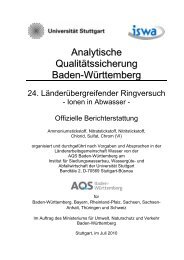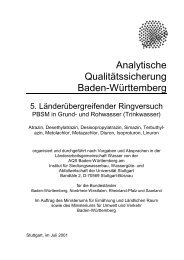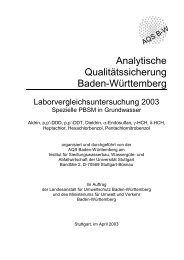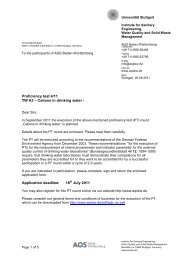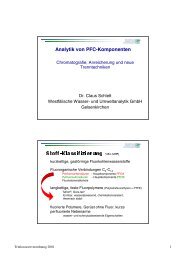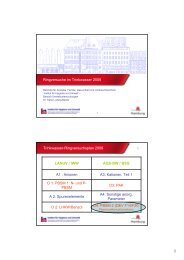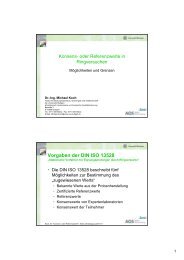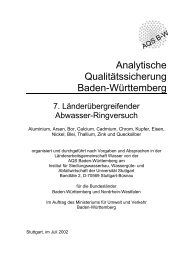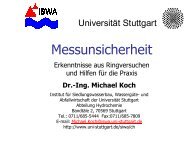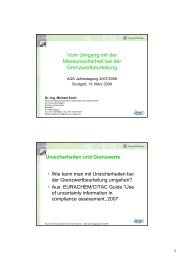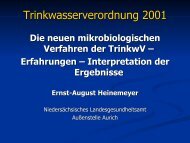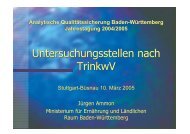Institute for Sanitary Engineering, Water Quality and Solid Waste ...
Institute for Sanitary Engineering, Water Quality and Solid Waste ...
Institute for Sanitary Engineering, Water Quality and Solid Waste ...
Create successful ePaper yourself
Turn your PDF publications into a flip-book with our unique Google optimized e-Paper software.
Chair of <strong>Waste</strong> Management <strong>and</strong> Emissions<br />
<strong>Solid</strong> <strong>Waste</strong> Management<br />
Research topics:<br />
• <strong>Waste</strong> avoidance<br />
• Development of new waste management<br />
strategies<br />
• Simulation of solid waste management<br />
systems<br />
• Collection <strong>and</strong> transport of solid<br />
waste<br />
• Recycling of valuable materials<br />
• Biological treatment: composting<br />
<strong>and</strong> fermentation<br />
• New measurement methods <strong>for</strong><br />
the analysis of odour, dust <strong>and</strong><br />
germs<br />
• Environmental impact assessment<br />
of earth burial <strong>and</strong> cremation<br />
• Decentralized waste management<br />
systems in tourist regions<br />
• Physical <strong>and</strong> chemical analysis of<br />
solid waste<br />
In our job, we’re on top of the pile<br />
<strong>Waste</strong> is a potentially valuable material in the wrong place. This statement is the central principle of many activities<br />
of our municipal solid waste section. Focal points are avoidance, utilisation <strong>and</strong> environmentally friendly<br />
treatment of municipal <strong>and</strong> commercial waste.<br />
Both ecological <strong>and</strong> economical aspects are dealt with. It has been shown, e.g., that avoidance of waste in<br />
commercial operations can be financially interesting <strong>for</strong> the companies concerned. We are intensively busy with<br />
the question of how waste management of the future may look. Some questions here are: which waste types<br />
should continue to be collected separately? Which mixtures of substances can be separated using new technical<br />
methods? Can part of the waste be economically transported by rail? Several research projects are occupied<br />
with the treatment of biological waste, among others with the questions: do pollutants exist in organic wastes?<br />
Are these pollutants reduced during composting? What energy potential is concealed in organic waste, if they<br />
are used in fermentation plants to generate biogas or employed in biomass power stations? For the creation of<br />
waste management concepts <strong>for</strong> communities or counties, the simulation <strong>and</strong> modelling of waste streams <strong>and</strong><br />
utilisation techniques play a major role. Because even humans can become a waste problem from an ecological<br />
point of view, we have carried out investigations on the ecological effects of burials <strong>and</strong> cremations. For a number<br />
of communities, our investigations on decentral concepts <strong>for</strong> waste treatment in tourist regions are of particular<br />
interest. These isl<strong>and</strong> solutions allow processes <strong>for</strong> waste <strong>and</strong> sewage treatment to be combined with the generation<br />
of service water <strong>and</strong> power. Decentral <strong>and</strong> adapted technology is of prime importance <strong>for</strong> the sustainable<br />
development of third-world <strong>and</strong> fast-developing countries. This is why we have established cooperation <strong>and</strong> joint<br />
projects with institutions in Brazil, Costa Rica, Egypt, Turkey, China <strong>and</strong> other countries.<br />
74



